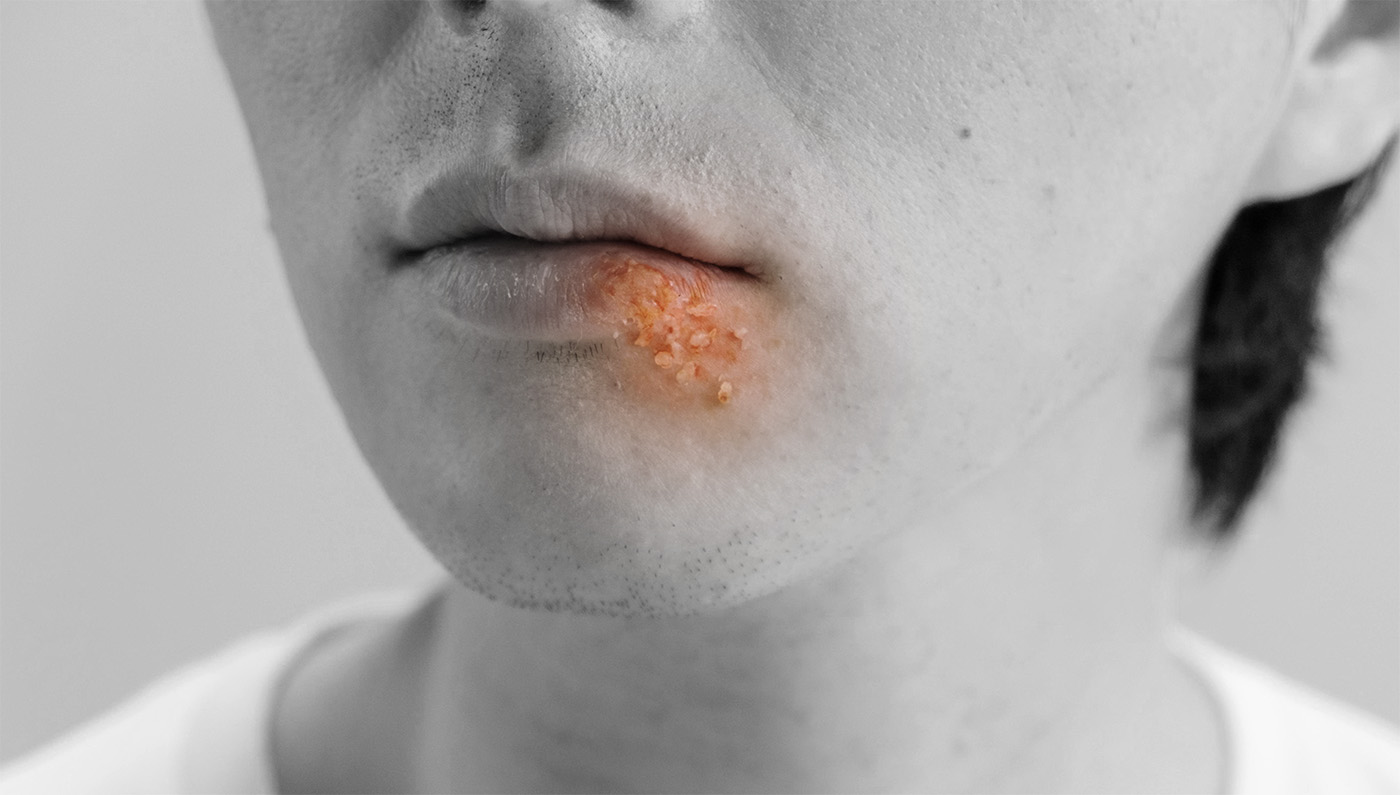Herpes Testing for Cold Sores: Stop Guessing, Start Knowing
In this post, we will take you through the various types of herpes, their appearance, the locations they can occur, and the stages an outbreak takes so that you can know what to expect. By the end, you shall have a better understanding of this very common virus, and you will be more prepared to deal with it.
Oral Herpes: It is Not Just a Cold Sore
Oral herpes, caused by the herpes simplex virus, type 1, is what people commonly think about when the term "cold sores" is brought up.
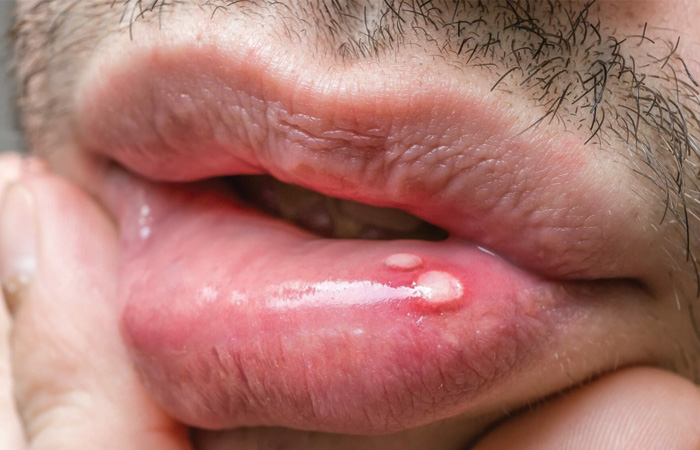
Those painful, fluid-filled blisters that range in placement from usually on the lips, sometimes reaching other parts of the face to even inside the mouth.
- Tingling before blisters appear: A primary symptom of an outbreak of oral herpes may be the tingling or itching sensation around the mouth. This is called the prodrome stage, where your body is warning you of an imminent outbreak.
- Blisters and Open Sores: Shortly after the onset of tingling, groups of small, clear fluid-filled blisters will begin to appear. They often occur in a cluster and may be very painful. In a matter of days, the blisters will rupture, leaving red, raw open sores behind them.
- Crusting and Healing: After bursting, the blisters start to crust over and heal. This crusting stage means that your body is battling off the virus and is starting to heal, but the area may still be sensitive.
Oral herpes doesn't just appear on the lips. HSV-1 can cause sores on the chin, cheeks, and even inside your nostrils. Sometimes it can affect the inside of the mouth, including the gums and the tongue, which may be quite painful to eat and talk with.
Genital Herpes: More Than Just "Down There"
Genital herpes is usually transmitted through sexual intercourse. It is in most cases caused by herpes simplex virus type 2, though herpes simplex virus type 1 can cause this disease through oral-genital sex.
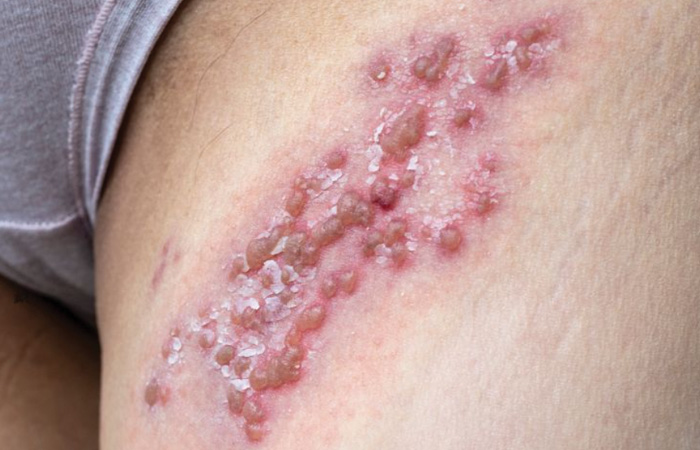
Being able to identify the symptoms of genital herpes is crucial in keeping outbreaks managed and reduces the risk of sexually transmitting it to others.
- Genital Blisters: Like oral herpes, the infection of genital herpes begins with an itching or burning sensation down the area of infection. Small blisters then begin to crop up around the penis, vagina, or anus and sometimes on the buttocks or upper thighs.
- Painful Open Sores: The symptoms of the blister that burst will leave behind open sores. These sores are painful and take a long time to recover. During this time, it is highly contagious.
In addition to the sores and blisters, there can be itching or burning sensations in the genital areas for most people. This would make regular activities such as walking or sitting painful.
One of the trickier things about genital herpes is that it's not necessarily only your genitals that get infected. You can get sores on your thighs, buttocks, or even the lower back, particularly if there's been skin-to-skin contact with an infected area. Less obvious symptoms should be watched out for, as these too can be symptoms of an outbreak.
Anal Herpes: Yes, It Can Happen Here Too
Anal herpes, also known as anus Herpes or Herpes on the buttocks is another form of HSV infection that is less talked about.
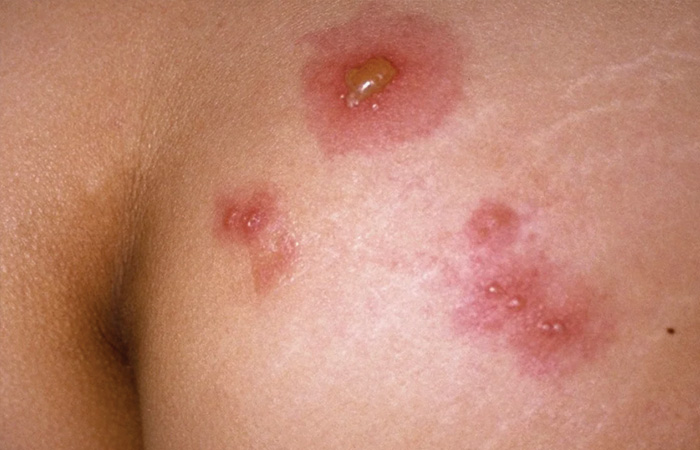
It could be either oral or genital herpes that eventually develops into anal herpes, especially in cases where direct anal contact occurs during an outbreak. It is very important to be able to recognize its symptoms because they easily get confused with symptoms of other conditions.
- Blisters Around the Anus: Just like genital herpes, anal herpes begins with painful blistering around the anus. The blisters are filled with fluid and may burst open, leaving painful, infected open sores that heal very slowly.
- Painful Bowel Movements: A symptom that is quite annoying is painful bowel movements with anal herpes. The sores can make it very painful to go to the bathroom, and many report constipation due to a fear of further irritating sores.
- Chronic Itching: Like the other herpes types, this virus causes chronic itching in the region long before the blisters appear. It can last through an outbreak and even into the healing process.
The outbreaks of herpes around the anus heal more slowly because of the continuous abrading and moisture. Keeping the area clean and dry will help to heal the lesions and reduce discomfort.
Other Places Herpes Can Turn Up: Surprising Spots
Most people think herpes only turns up on the mouth and in the genital area, but this is not entirely right; the virus can show up almost anywhere.
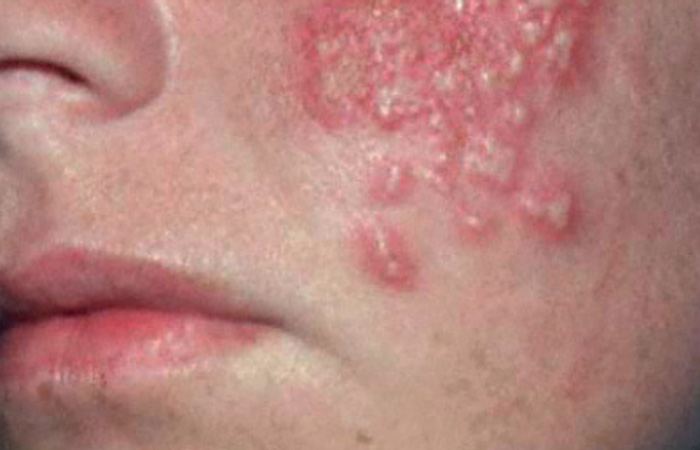
Following are the rest of the locations where herpes shows up:
- Facial Herpes: Herpes also appear on the cheeks, chin, and/or around the nose. Normally this is the result of a different kind of virus, namely HSV-1, which causes painful blistering or sores, often first appearing as many small fluid-filled bumps that may burn, itch, or tingle before they crust over and ooze open to become red, raw sores. It gives discomfort in talking, eating, and even just a touch on the face where the herpes is located. These sores may leave scars when left untreated and take a little longer to heal, especially on sensitive areas of the skin.
- Herpes of the Scalp: Though rare, herpes can affect the scalp as well. This is called herpetic folliculitis and essentially means that the herpes virus has infected the hair follicles. Symptoms range from painful, fluid-filled blisters on the scalp with itching or burning sensations to rendering a simple act like brushing or washing your hair rather painful. In severe instances, inflammation around the follicles might cause hair loss in that area of the head.
-
Herpetic Whitlow (Fingers): Herpetic whitlow is a rare kind of herpes infection that involves the fingers. This may occur if your finger comes into direct contact with an infected area of active herpes rash, especially if there is a cut or break in the skin. Symptoms involve painful blisters on the fingers that may make everyday activities like typing or using your phone very difficult.
-
Ocular Herpes (Eyes): In case the herpes virus spreads to the eyes, one may develop ocular herpes. The infection is characterized by redness, pain in the area, and blurred vision. Ocular herpes, if left unattended, can lead to irreparable damage in the cornea. Ocular herpes is considered an emergency condition and should be treated immediately when one suspects its development.
- Herpes on the Tongue: The blisters can also form on the tongue, which creates discomfort while taking food or even speaking. The look of these ulcers is the same as cold sore. These can be quite painful. In some cases, herpes of the tongue can be confused with other oral conditions such as canker sores, but filled fluid blisters typically become a sure identification.
The Stages of a Herpes Outbreak: What to Expect
A herpes outbreak doesn't just occur all of a sudden. An outbreak occurs in stages, each stage with its set of symptoms.

A typical herpes outbreak consists of five stages, explained below:
- Prodromal and Blister Stage: The first sign that an outbreak is about to occur is the prodromal phase, during which you may feel itching, tingling, or even burning in the area where the outbreak will occur. These signs can be from a few hours up to two days before the blister stage. After a short period of time, small blisters filled with fluid begin to appear on the skin, which may occur in clusters and be painful.
- Ulcer stage: When these blisters break, they leave behind open sores or ulcers, which are rather painful. This stage is the most contagious because the virus resides in the fluid from the burst blisters.
- Crusting and Healing Stage: Ulcers in that area start crusting or forming scabs as they begin to heal. When the scabs fall off, the skin heals and may remain tender for some time. The herpes virus retreats into the body and goes into a dormant stage until the next outbreak.
Knowing these stages can help you better prepare for an outbreak by finding ways to effectively manage symptoms.
Prevention: How to Protect Yourself and Others
While there is no cure for herpes, there are precautions you can take that might lower your chances of getting the virus, or giving it to someone else. Here are some key prevention tips:
- Avoid Skin-to-Skin Contact: Herpes is transferred through direct skin contact, particularly during the time of an outbreak. If you have lesions, avoid touching them, and don't allow anyone else to touch them. More importantly, this must be prevented when the blister and ulcer stages are still present because the virus is highly contagious at that point.
- Wear Protection: Condoms and dental dams cannot completely eliminate the danger of getting herpes during sexual intercourse, but they might help minimize the transmission. Remember that herpes can still be transmitted to or from areas that are not covered by a condom. It's not foolproof, but one good precaution that one should still have.
- Manage Stress: Stress is one of the most common herpes outbreak triggers. Regular exercise, meditation, or simply finding ways to keep stress at bay can often lessen the frequency of your outbreaks. A healthy lifestyle such as getting enough rest, proper nutrition, and regular exercise will also help improve your immune system in keeping the virus at bay.
Treatment: The Management of Herpes Outbreaks
Even though there is no cure for herpes, various treatments exist to temper the symptoms of the infection and reduce the periodic occurrence of symptoms.
- Antiviral Medications: The most commonly prescribed antiviral medications to manage herpes infection include acyclovir and valacyclovir. These drugs speed up the healing process if there is an outbreak, diminish the symptoms, and decrease the risk of transmission to others. They are most effective when taken immediately after the appearance of the first signs of an outbreak, such as tingling or itching. For people who experience frequent outbreaks, suppressive therapy—taking antiviral medication daily—can help prevent future outbreaks and lower the risk of transmitting the virus to sexual partners.
Creams Applied Topically
Over-the-counter topical creams like docosanol can help alleviate cold sores caused by oral herpes. These creams do not prevent outbreaks from occurring or cure herpes, but they can reduce discomfort and shorten the healing time of cold sores. Topical creams work best if applied at the first sign of an outbreak, during the tingling stage.
Home Remedies
Some people treat the symptoms of herpes with simple home remedies. A cold compress or an ice pack can reduce swelling and numb pain in the affected area. Over-the-counter pain relievers, such as ibuprofen or acetaminophen, can also provide pain management during an outbreak.
Other treatments that can help soothe irritated skin include taking a warm bath and applying petroleum jelly to the skin around the sores. Though these remedies won’t cure herpes, they can provide some relief and help make the healing process more comfortable.
Take Control with the Herpes Rapid Test Kit
Don’t wait for a doctor’s appointment to check for herpes if you suspect you may have the infection or are experiencing symptoms.
Check Your STD Status in Minutes
Test at Home with RemediumGenital & Oral Herpes Test Kit
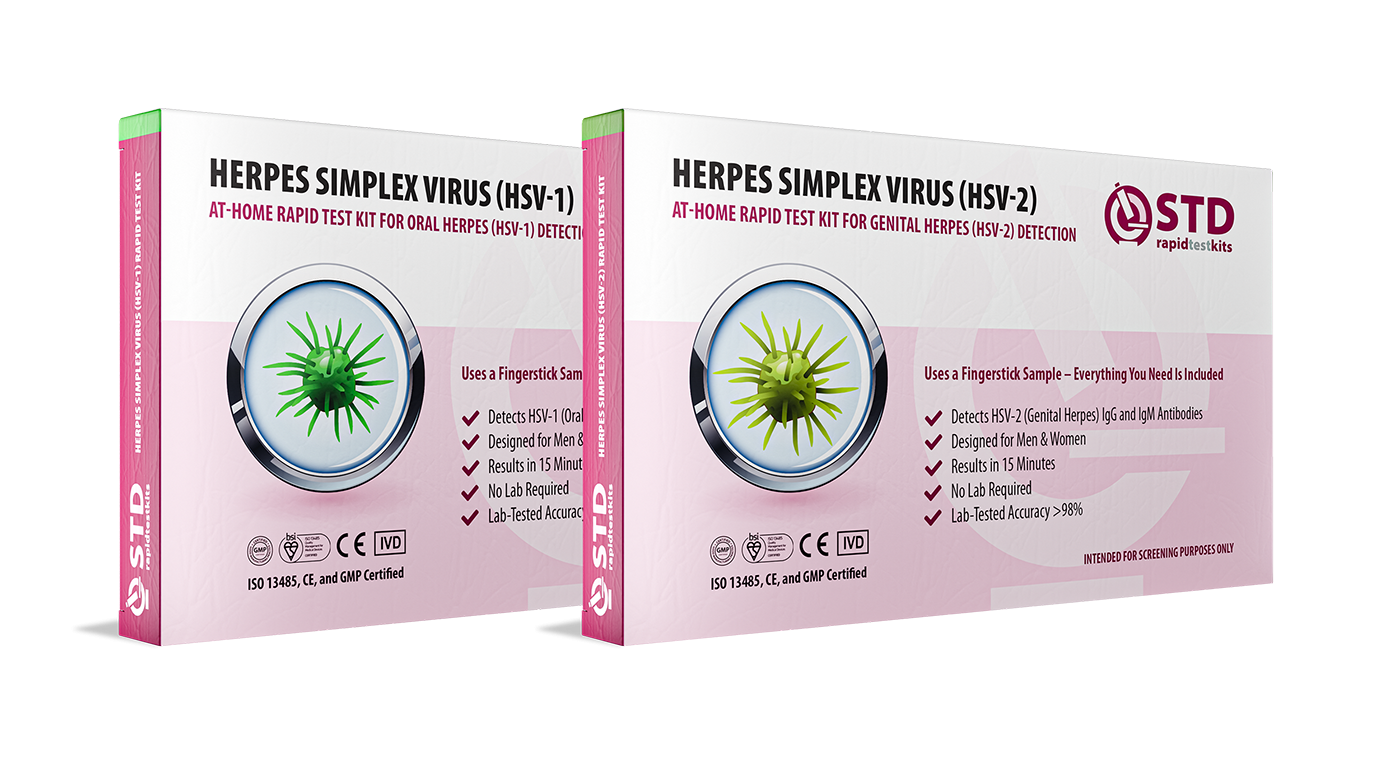
 For Men & Women
For Men & Women Results in Minutes
Results in Minutes No Lab Needed
No Lab Needed Private & Discreet
Private & DiscreetOrder Now $75.00 $98.00
For all 2 tests
You can take control of your health by using the Herpes Rapid Test Kit from the comfort of your home. This test allows you to check for both HSV-1 and HSV-2.
The Herpes Rapid Test Kit is easy to use, simply follow the instructions provided, and you’ll know within minutes whether you need to seek further medical care. It’s the perfect solution for anyone wanting to take control of their health without the hassle of scheduling a doctor’s visit.
References:
-
Centers for Disease Control and Prevention (CDC) – Herpes Simplex Virus (HSV)
https://www.cdc.gov/herpes/about/index.html -
World Health Organization (WHO) – Herpes Simplex Virus
https://www.who.int/news-room/fact-sheets/detail/herpes-simplex-virus -
Mayo Clinic – Genital Herpes
https://www.mayoclinic.org/diseases-conditions/genital-herpes/symptoms-causes/syc-20356161 -
Johns Hopkins Medicine – Herpes Simplex Virus Infections
https://www.hopkinsmedicine.org/health/conditions-and-diseases/herpes-hsv1-and-hsv2 -
American Sexual Health Association (ASHA) – Herpes
https://www.ashasexualhealth.org/herpes/ -
MedlinePlus – Herpes Simplex
https://medlineplus.gov/herpessimplex.html -
National Institutes of Health (NIH) – Herpes Simplex Virus
https://www.niaid.nih.gov/diseases-conditions/herpes






